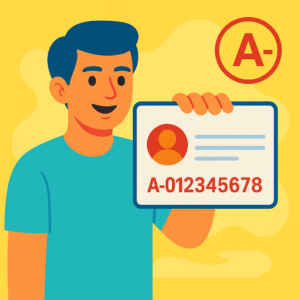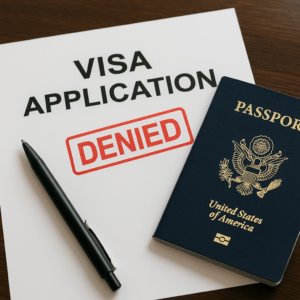The U.S. Alien Registration Number, commonly abbreviated as an A-Number, is a unique identifier assigned to non-citizens by the United States Citizenship and Immigration Services (“USCIS”). This A-Number begins with the letter “A” followed by 8 or 9 numbers (such as A012345678). It is used to track individuals throughout their interactions with U.S. immigration authorities.
Who Has a U.S. Alien Registration Number?
Anyone who is not a U.S. citizen but resides in the United States may be assigned an Alien Registration Number. This includes lawful permanent residents (green card holders), individuals on temporary visas, refugees, and asylum seekers. Even individuals who are in the U.S. without legal authorization may have an A-Number if they have had interactions with immigration authorities or if they are in proceedings to determine their immigration status.
What is the U.S. Alien Registration Number it used for?
- Identification: The primary purpose of the U.S. Alien Registration Number is to uniquely identify non-citizens in various interactions with U.S. government agencies, particularly those related to immigration and residency.
- Immigration Proceedings: A-Numbers are used extensively in immigration proceedings, including applications for green cards, asylum, and citizenship. They help immigration officials track individuals’ histories, applications, and statuses within the complex immigration system.
- Employment Authorization: Non-citizens who are authorized to work in the United States typically need to provide their Alien Registration Numbers to their employers for verification purposes, although the A-Number is not, on its own, evidence of work authorization.
- Taxation: A-Numbers may also be used for tax purposes, particularly for non-citizens who are required to file U.S. tax returns. This helps the Internal Revenue Service track tax liabilities and contributions.
- Law Enforcement: In some cases, law enforcement agencies may use A-Numbers to identify and track individuals who are involved in legal proceedings or criminal activities.
How to Find Your U.S. Alien Registration Number
If you are unsure whether you have a U.S. Alien Registration Number or need to locate it, there are several ways to do so:
- Immigration Documents: Your Alien Registration Number may be listed on various immigration documents, such as your green card, employment authorization card (EAD), or notices from USCIS.
- Correspondence from USCIS: Any official correspondence you have received from USCIS regarding your immigration status or applications will likely include your Alien Registration Number.
- Contact USCIS: If you still can’t find your A-Number, you can contact USCIS directly for assistance. Be prepared to provide personal information to verify your identity.
The U.S. Alien Registration Number plays a vital role in the immigration process for non-citizens residing in the United States. From identification to immigration proceedings and beyond, this unique identifier is essential for navigating the complex legal and administrative landscape of U.S. immigration law. Understanding its significance can help individuals better manage their immigration statuses and interactions with government agencies.
If you have questions about U.S. visas or immigration matters, contact us at info@enterlinepartners.com and speak with a U.S. immigration attorney in Ho Chi Minh City, Manila and Taipei.
ENTERLINE & PARTNERS CONSULTING
Ho Chi Minh City, Vietnam Office
146C7 Nguyen Van Huong St, Thao Dien Ward,
District 2, Thu Duc City
Ho Chi Minh City, Vietnam
Tel: +84 933 301 488
Email: info@enterlinepartners.com
Facebook: Enterline & Partners – Dịch vụ Thị thực và Định cư Hoa Kỳ
YouTube: @EnterlineAndPartnersConsulting
Website: http://enterlinepartners.com
Manila, Philippines Office
Tel: +63 917 543 7926
Email: info@enterlinepartners.com
Facebook: Enterline and Partners Philippines
Website: https://enterlinepartners.com/language/en/welcome/
Copyright 2024. This article is for information purposes only and does not constitute legal advice. This article may be changed with or without notice. The opinions expressed in this article are those of Enterline and Partners only.








